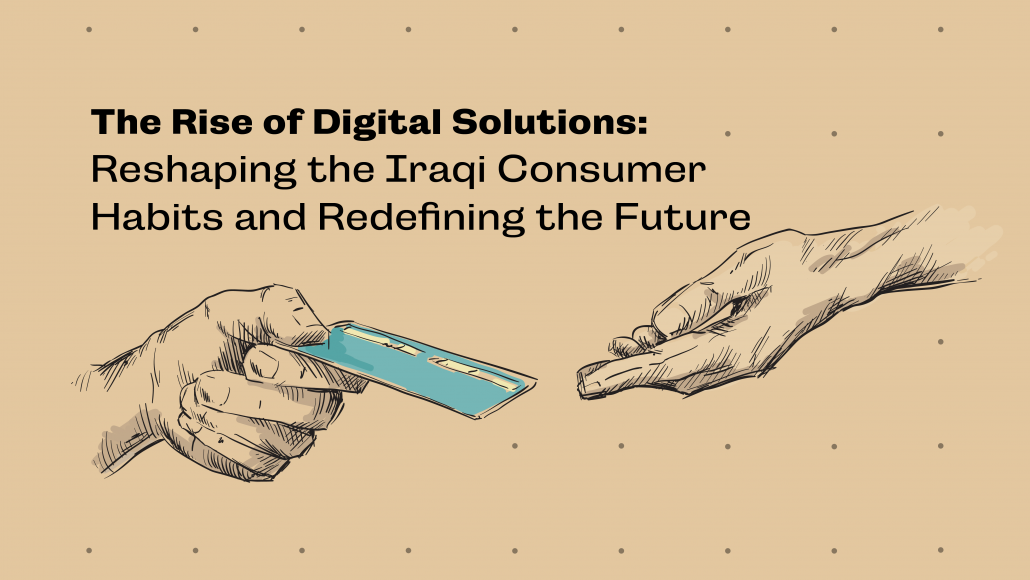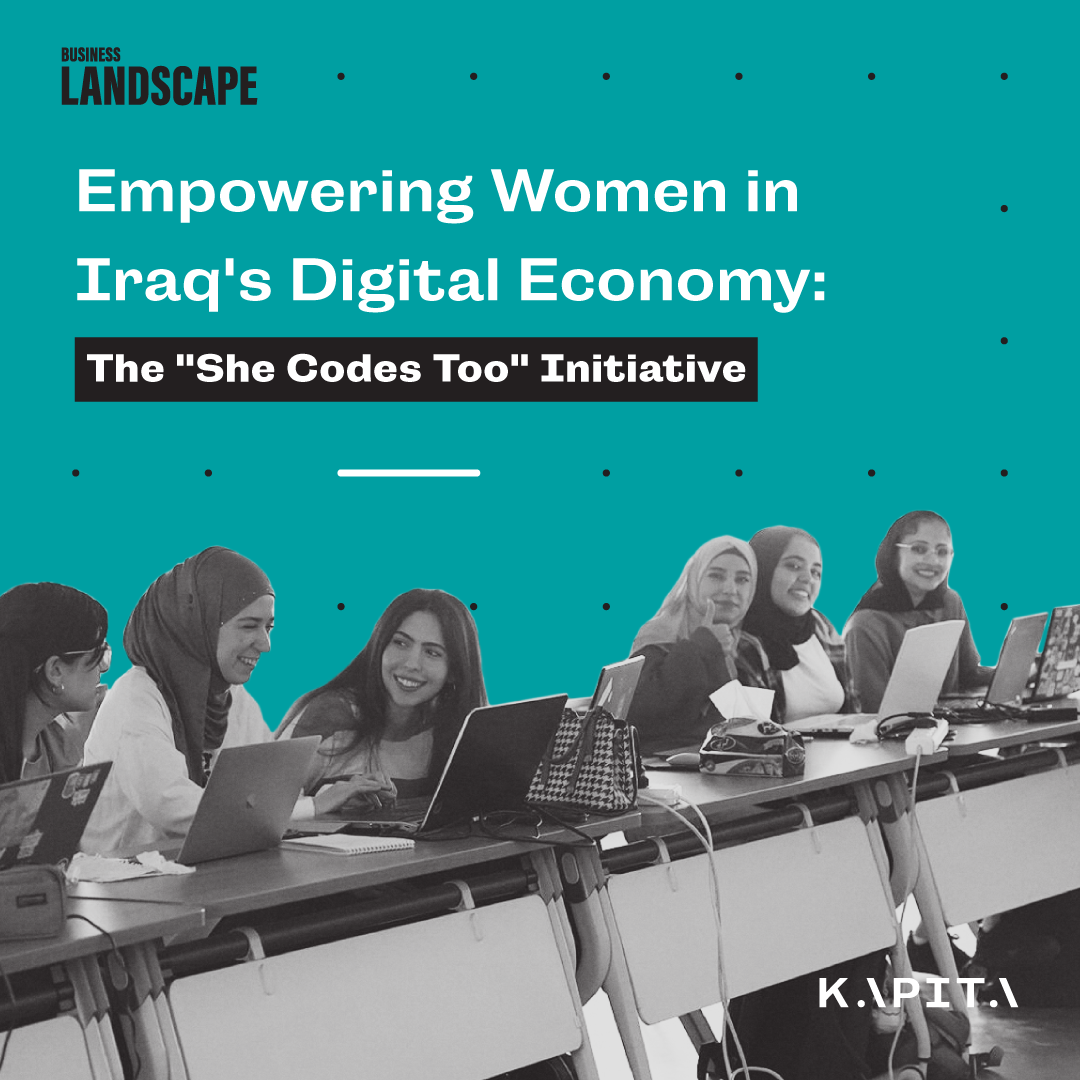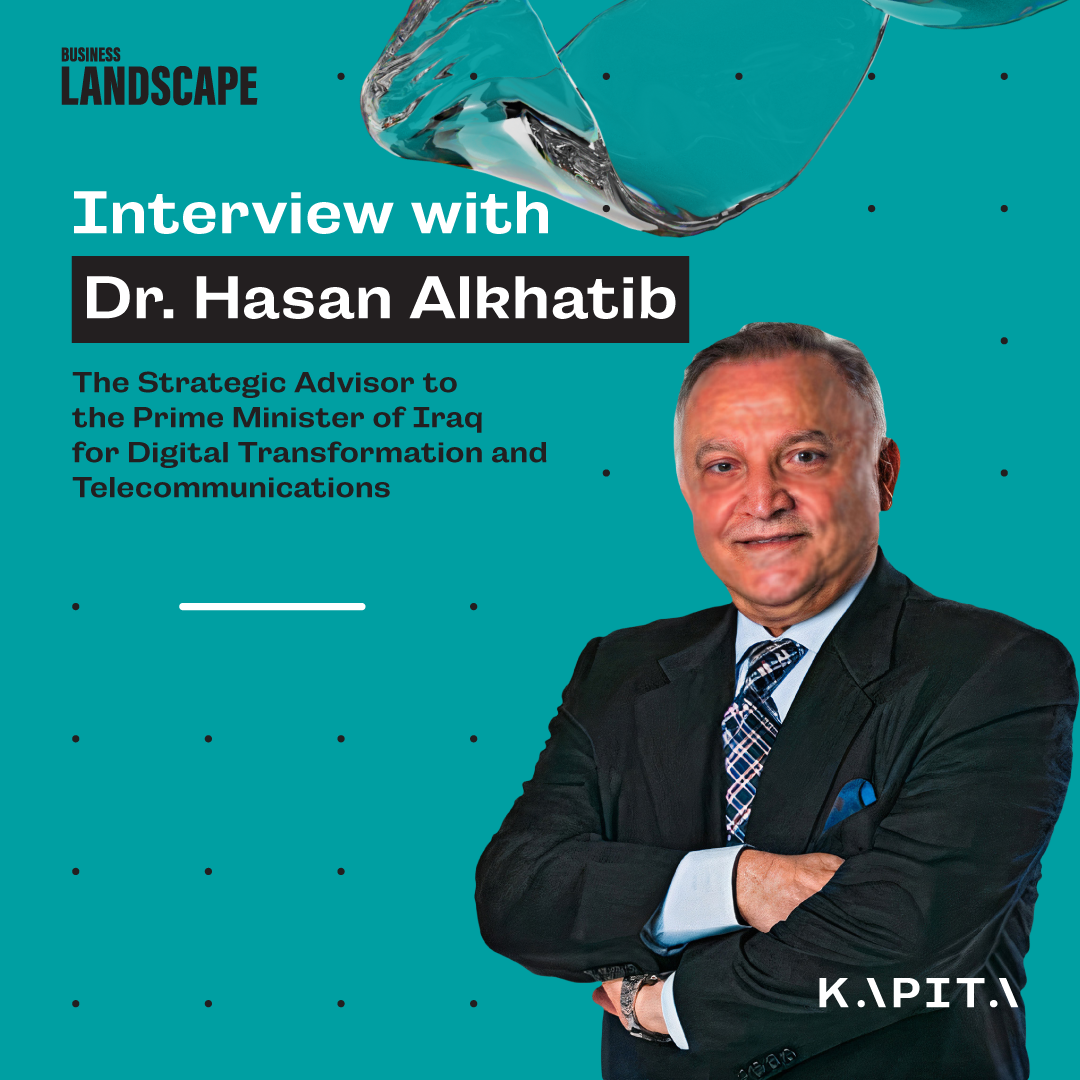The Rise of Digital Solutions: Reshaping the Iraqi Consumer Habits and Redefining the Future
Al-Muheleb Al-Zaidy
CCOM and Media Production Director, Earthlink
Iraq's digital landscape has been growing steadily over the past few years, with an increasing number of people using different platforms, including e-commerce, banking, ride-hailing, food delivery, and other digital solutions. The COVID-19 pandemic has highlighted the importance of digital transformation in Iraq, with businesses and organizations needing to adapt to remote work and online communication. The government has recognized this need and is working towards improving digital infrastructure and expanding internet access nationwide. Digital transformation is becoming crucial for businesses and organizations to stay competitive. Despite infrastructure and digital literacy challenges, Iraq offers significant opportunities for digital growth and innovation. However, strategic investments in technology and education are essential for sustainable progress and digital inclusion.
The largest internet provider in Iraq, Earthlink has played a significant role in driving the digital revolution by improving connectivity and access to the internet for millions of people in the country, which helped businesses thrive, enabled students to access better education, and facilitated communication among family and friends, thereby fostering economic growth and improving social connections in Iraq.
Gaming Platforms: Unveiling the Power of Entertainment
Despite years of conflict, Iraq has seen a dramatic rise in the popularity of gaming, mostly due to its widespread availability thanks to smartphones, affordable gaming consoles, and internet penetration. Market research indicates that Iraq's gaming industry is rapidly growing, with an estimated $150 million in consumer expenditure on video games and esports in 2019. This trend will likely continue with the young population's increasing interest in gaming, improved infrastructure, and the government's efforts to attract investors in the industry. It is safe to say that gaming has become a culturally significant phenomenon in Iraq.
The gaming industry has greatly impacted the economy and job market in Iraq. It has created many job opportunities for youth, such as game developers, graphic designers, and animators. Furthermore, the industry has attracted foreign investment, thereby boosting the economy. Gamers in Iraq now have access to various resources and platforms for talent development, which fosters creativity and innovation amongst Iraq's youth. As technology continues to advance and the industry continues to grow globally, the gaming industry in Iraq is expected to have a bright future.
E-sports are growing in popularity in Iraq, despite challenges such as inconsistent electricity and internet access. The country's e-sports community has organized tournaments and competitions for popular games like PUBG, Fortnite, and League of Legends. The Iraqi government has also shown support for the industry, recognizing e-sports as an official sport in 2019 and allocating funds for building e-sports arenas. However, cultural attitudes towards gaming and the lack of infrastructure remain obstacles to the growth of e-sports in Iraq. Earthlink is tackling this area to be the major organizer in the E-Sports arena, capitalizing on its infrastructure and its customer reach.
Streaming Services: Revolutionizing Media Consumption
The emergence of streaming services has brought about a transformative shift in Iraq's media landscape, revolutionizing the way people consume content. These digital platforms have progressed significantly in recent years, offering a wide array of entertainment options to the Iraqi audience.
In Iraq, both local and international streaming platforms have gained traction, attracting a growing subscriber base with their diverse content offerings. Local streaming providers expanded their regional presence, providing access to a vast library of movies, TV shows, and documentaries. They emerged, catering to the preferences of Iraqi viewers by offering Arabic content, including popular series and films.
AlManasa OTTP emerged in 2022 as the first local platform with legal content. Offering Video on Demand and Live Stream Services. AlManasa made significant announcement when it made a partnership with a major international content provider, Starzplay, and major local content provider, AlRabaa, to cover two important contents for their viewers, Italian League and Iraqi National Football team matches.
The proliferation of smartphones and improved internet connectivity has played a pivotal role in fueling the rise of streaming services in Iraq. With the majority of the population having access to mobile devices, audiences can now access their favorite content on the go, contributing to the rapid adoption of these platforms.
While streaming services have introduced a dynamic and convenient way to consume media, they also face unique challenges in Iraq's market. Issues such as limited internet bandwidth, slow internet speed, and the prices of data packages can hinder the seamless streaming experience. Additionally, digital piracy remains a concern, impacting both local and international content providers.
Some ISPs in Iraq built their own CDNs; which is a group of servers distributed in a geographical location to speed the delivery of the content coming from other servers outside Iraq, by saving it inside the servers. The CDN works automatically on saving the most watched content on the servers and reduce international internet traffic. Most ISPs built their own ISPs to enhance the customer experience when watching content in 4k or HR online, and it is worth mentioning that Earthlink Telecommunications has the biggest CDN nods in region and offers building servers as a service for other companies.
Despite these challenges, streaming services in Iraq present remarkable opportunities for growth. By offering localized content and tailoring their services to the cultural preferences of the Iraqi audience, these platforms can build stronger connections with subscribers. Moreover, as internet infrastructure continues to improve, streaming services have the potential to reach a broader audience in Iraq's untapped markets.
Digital Payment (Tabadul): Paving the Way to a Cashless Society
E-payment in Iraq has seen significant growth in recent years, with an increasing number of platforms offering digital payment solutions. However, challenges remain to be addressed, including a lack of consumer trust in online payments and limited access to digital services in certain areas. Nevertheless, the Central Bank of Iraq is working to promote the use of e-payment methods and increase financial inclusion through digital channels, focusing on improving infrastructure and regulation to support the growth of these services.
Tabadul is a new e-payment system introduced in Iraq. This system is designed to provide users with a secure and convenient digital payment method. Tabadul facilitates transactions for users by allowing them to pay bills, transfer funds, and purchase through a mobile app. The service is available 24/7 and can be accessed easily anywhere in Iraq. With Tabadul, users can enjoy hassle-free transactions without the need for cash. Overall, this new e-payment system is expected to enhance financial services and drive the country's economy toward digitalization. Earthlink has started a joint activity with Tabadul to boost the use of e-payment through the ease of reaching internet services on the Tabadul platform.
Government Support for Digital Transformation:
Recognizing the potential of digital technologies, the Iraqi government has to take tangible steps to modernize billing and taxation systems. Embracing digital transformation allows for greater accuracy, transparency, and accessibility in financial transactions. Iraqi authorities have to introduce various initiatives to facilitate the shift toward digital billing and taxation. The adoption of electronic invoicing and digital tax reporting systems enables real-time monitoring and data collection. Additionally, the government is actively promoting online payment methods and electronic tax filing, encouraging businesses and individuals to embrace digital platforms.
The implementation of digital billing and taxation systems offers significant advantages for both businesses and individuals. For businesses, these systems result in increased operational efficiency, reduced paperwork, and quicker payment processing. Moreover, digital platforms allow for improved record-keeping and data accuracy, leading to better financial management and decision-making.
Individuals also benefit from digital transformation, as it simplifies the tax filing process and enhances transparency. With digital tax reporting, taxpayers can easily access their financial records and track their tax obligations, leading to greater compliance and reduced tax evasion.
E-commerce: Startups Reshaping Customers Behavior
The growth and impact of e-commerce in Iraq have witnessed outstanding progress, driven by the rise of online marketplaces and startups. The proliferation of internet access and increased smartphone usage has fueled the adoption of online platforms, enabling entrepreneurs to reach a broader customer base and tap into new market segments.
Despite its potential, e-commerce in Iraq faces several challenges. Infrastructure limitations, including internet connectivity and logistical issues, pose hurdles to the sector's seamless growth. Additionally, navigating the regulatory landscape and adapting to consumer preferences and behavior remain critical concerns for entrepreneurs seeking to establish a successful online presence.
However, there is promising potential that e-commerce will expand rapidly as more Iraqis gain access to the internet and become familiar with online shopping. Evidently, advancements in digital payments and logistics solutions will play a significant role in overcoming current obstacles.
Tamata and Taza, Earthlink’s sister companies, are one of the success stories that highlight the transformative power of digitalization for Iraqi entrepreneurs. Through embracing e-commerce platforms, Tamata has thrived, reaching wide national audiences. Digital transformation has empowered entrepreneurs with data-driven insights, enabling them to make informed decisions and optimize their operations.
Talent Building: Nurturing a Skilled Digital Workforce
In Iraq's digital transformation journey, talent development and skill-building play a pivotal role in driving progress and growth. As the country embraces the digital era, fostering a skilled workforce capable of navigating the challenges and opportunities brought by technological advancements becomes increasingly crucial.
Recognizing this importance, Earthlink has taken significant initiatives to promote digital literacy and provide training opportunities to individuals seeking to enhance their digital skills. Earthlink Iraq and Etisalat Academy by e& have recently established the Earthlink Academy in Iraq. The primary objective of this partnership is to provide comprehensive training programs to empower and upskill the workforce of Iraqi employees at Earthlink. The training will focus on various aspects of business operations, leadership capabilities, talent development, knowledge transfer, and vocational training. The comprehensive training curriculum will cover essential areas such as telecom concepts, cutting-edge technologies, network infrastructure, customer management, leadership principles, emerging technologies like IoT and AI, data center solutions, and more. The Academy will offer a wide range of courses, certifications, and accreditation, supported by state-of-the-art facilities and diverse learning experiences like webinars and workshops.
Moreover, Ta3leem, another of Earthlink’s sister companies, is an advanced e-learning platform for interactive open online education. It is designed according to Harvard University's e-learning platform standards to provide everyone with educational content and resources easily and conveniently. Its aim is to enhance learning opportunities, apply advanced technology to the education system, and improve the quality of primary, secondary, and university education. This is achieved through the contributions of a distinguished group of academics and professors from various disciplines. We take the learning process to a new level of interactivity by combining fun with education. These initiatives aim to bridge the digital divide, ensuring that the workforce is well-equipped to participate actively in the modern economy.
By nurturing a skilled digital workforce, Iraq can unlock a plethora of opportunities for innovation and economic development. A workforce adept in digital technologies can harness the power of data, artificial intelligence, and automation to streamline processes, enhance productivity, and drive overall economic growth.
Furthermore, a skilled workforce becomes the driving force behind innovation, encouraging the creation of new digital products, services, and solutions tailored to the country's specific needs and challenges. As businesses and industries embrace digital transformation, the demand for a digitally proficient workforce continues to grow, making talent development a top priority for Iraq's sustainable progress.
Conclusion:
Iraq's digital transformation journey has made impressive strides, witnessing significant growth in various sectors. The country's digital landscape has expanded steadily, driven by the increasing popularity of e-commerce, gaming platforms, and streaming services. Notably, the government's recognition of the importance of digitalization has led to initiatives focused on enhancing digital infrastructure and promoting the adoption of e-payment systems. Earthlink, a key internet provider, has been at the forefront of this revolution, playing a pivotal role in supporting economic growth.
To ensure sustained digital progress, several key areas warrant attention. Addressing infrastructure limitations and navigating regulatory challenges are crucial steps in fostering seamless growth in e-commerce and digital services. Moreover, fostering a skilled digital workforce, as exemplified by the Earthlink Academy and Ta3leem e-learning platform, is essential to unlocking Iraq's innovation potential.
In driving Iraq's digital future, collaboration between the private sector, government, and stakeholders becomes imperative. By forging strategic partnerships and working together, Iraq can harness the transformative power of digital technologies, enabling data-driven decision-making, optimizing operations, and propelling economic growth. Embracing the opportunities presented by digitalization will drive Iraq towards a bright and innovative future, positioning it as a formidable player in the global digital economy.






